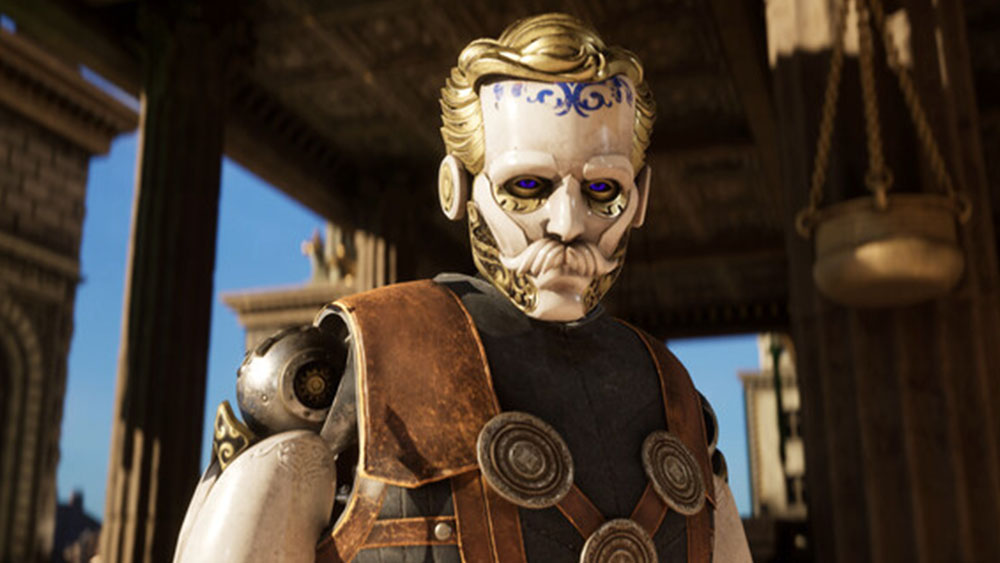What kind of AI is acceptable in video game development?

Daily design news, reviews, how-tos and more, as picked by the editors.
You are now subscribed
Your newsletter sign-up was successful
Want to add more newsletters?

Five times a week
CreativeBloq
Your daily dose of creative inspiration: unmissable art, design and tech news, reviews, expert commentary and buying advice.

Once a week
By Design
The design newsletter from Creative Bloq, bringing you the latest news and inspiration from the worlds of graphic design, branding, typography and more.

Once a week
State of the Art
Our digital art newsletter is your go-to source for the latest news, trends, and inspiration from the worlds of art, illustration, 3D modelling, game design, animation, and beyond.

Seasonal (around events)
Brand Impact Awards
Make an impression. Sign up to learn more about this prestigious award scheme, which celebrates the best of branding.
AI in video game development is generating huge debate. It's already being used massively, judging the amount of AI disclaimers on games on Steam, whether it's for visual assets, music or marketing materials or even whole games.
Some gamers don't want to play anything made with AI. Often that's for ethical reasons, including the murkiness of many AI companies' approach to copyright and the potential impact on jobs. But the uses of AI are many.
There are AI plugins that can speed up workflows in the best game development software for lots of tasks other than generating art or gameplay. So is there an ethical use of AI in video game development? That's a topic that Brian Fargo, founder of the Xbox studio InXile Entertainment, touched on in a recent interview.
Brian's career in game development goes back to role-playing games like The Bard’s Tale and Wasteland in the 1980s. He produced Fallout, and, as studio head at InXile, he's most recently been leading the development of the upcoming first-person steampunk RPG Clockwork Revolution.
Brian spoke to YouTuber MrMattyPlays in an interview not just about the game, but on his career and the controversial topic of generative AI in video games. After all, Microsoft, which owns InXile, is investing $80bn in the area at the same time as it cuts jobs.
Brian seems to have a more reserved view on AI than some others at Microsoft. He says he's worried about job losses and isn't in favour of AI uses that could be considered as plagiarism. But he also says that AI makes sense for mundane tasks that nobody wants to do, such as querying and cleaning up data and checking punctuation.
“These games…we’re close to about the same word count as the Bible, basically, and so that’s a lot of data no human can get in in its head,” he points out, adding: "I'd rather have the minds thinking about the good stuff."
Daily design news, reviews, how-tos and more, as picked by the editors.
He also suggests that AI imagery could be used for inspiration, comparing it to visiting a museum or Deviant Art. "I see things to be inspired by it, not to use it," he says. Other potential 'ethical' uses of AI he mentions include voicing last-minute pickup lines when an actor is unavailable – if the actor agrees to it and gets paid anyway. Another argument that Brian makes is that smaller developers are going to use AI with less care for what the media think about it, which could have a massive impact on established players that care more about their public image.
What do you think? What kinds of AI in video game design can be considered ethical? Or is all or none of it OK? Let us know your thoughts on the debate in the comments section below.

Joe is a regular freelance journalist and editor at Creative Bloq. He writes news, features and buying guides and keeps track of the best equipment and software for creatives, from video editing programs to monitors and accessories. A veteran news writer and photographer, he now works as a project manager at the London and Buenos Aires-based design, production and branding agency Hermana Creatives. There he manages a team of designers, photographers and video editors who specialise in producing visual content and design assets for the hospitality sector. He also dances Argentine tango.
You must confirm your public display name before commenting
Please logout and then login again, you will then be prompted to enter your display name.

